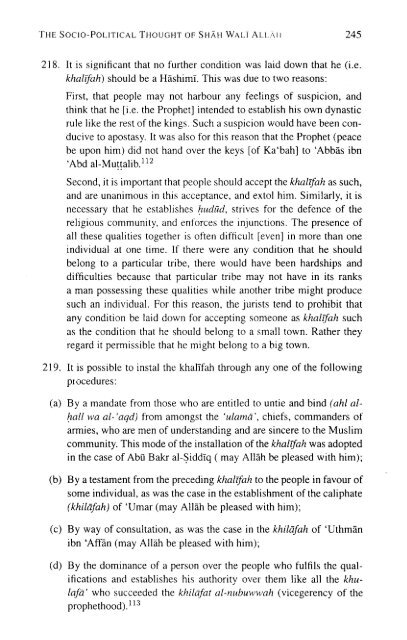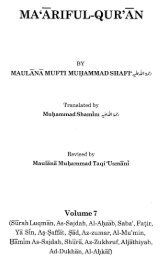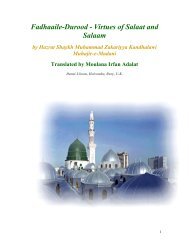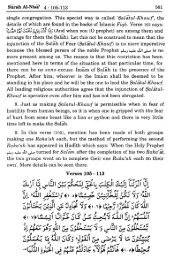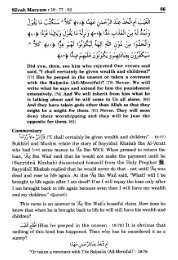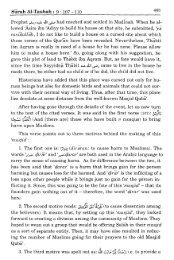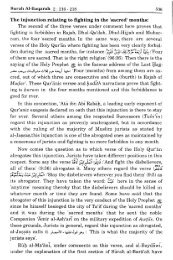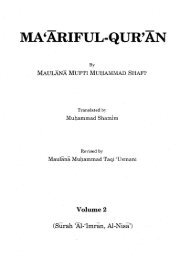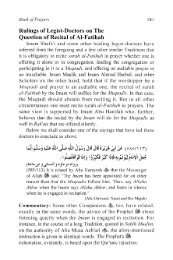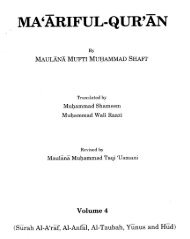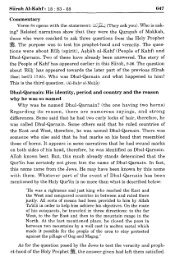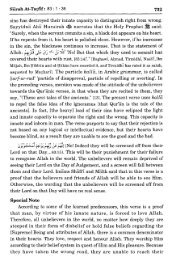Socio Political Thought Of Shah WaliAllah Rahmatullahi Alaihi
Socio Political Thought Of Shah WaliAllah Rahmatullahi Alaihi
Socio Political Thought Of Shah WaliAllah Rahmatullahi Alaihi
You also want an ePaper? Increase the reach of your titles
YUMPU automatically turns print PDFs into web optimized ePapers that Google loves.
2 18. It is significant that no further condition was laid down that he (i.e.<br />
khalqah) should be a Hiishimi. This was due to two reasons:<br />
First, that people may not harbour any feelings of suspicion, and<br />
think that he [i.e. the Prophet] intended to establish his own dynastic<br />
rule like the rest of the kings. Such a suspicion would have been conducive<br />
to apostasy. It was also for this reason that the Prophet (peace<br />
be upon him) did not hand over the keys [of Ka'bah] to 'Abbas ibn<br />
'Abd al-~uffalib."~<br />
Second, it is important that people should accept the khalfah as such,<br />
and are unanimous in this acceptance, and extol him. Similarly, it is<br />
necessary that he establishes hudfid, strives for the defence of the<br />
religious community, and enforces the injunctions. The presence of<br />
all these qualities together is often difficult [even] in more than one<br />
individual at one time. If there were any condition that he should<br />
belong to a particular tribe, there would have been hardships and<br />
difficulties because that particular tribe may not have in its ranks<br />
a man possessing these qualities while another tribe might produce<br />
such an individual. For this reason, the jurists tend to prohibit that<br />
any condition be laid down for accepting someone as khalgah such<br />
as the condition that he should belong to a small town. Rather they<br />
regard it permissible that he might belong to a big town.<br />
219. It is possible to instal the khalifah through any one of the following<br />
procedures:<br />
(a) By a mandate from those who are entitled to untie and bind (ah1 alhall<br />
wa al- 'crqd) from amongst the 'ulamd', chiefs, commanders of<br />
armies, who are men of understanding and are sincere to the Muslim<br />
community. This mode of the installation of the khalfah was adopted<br />
in the case of AbO Bakr al-Siddiq ( may Allah be pleased with him);<br />
(b) By a testament from the preceding khalfah to the people in favour of<br />
some individual, as was the case in the establishment of the caliphate<br />
(khiliifah) of 'Umar (may Allah be pleased with him);<br />
(c) By way of consultation, as was the case in the khiliifah of 'Uthman<br />
ibn 'Affan (may Allah be pleased with him);<br />
(d) By the dominance of a person over the people who fulfils the qualifications<br />
and establishes his authority over them like all the khulafd'<br />
who succeeded the khildfat a/-nubuwwah (vicegerency of the<br />
prophethood). 11"


